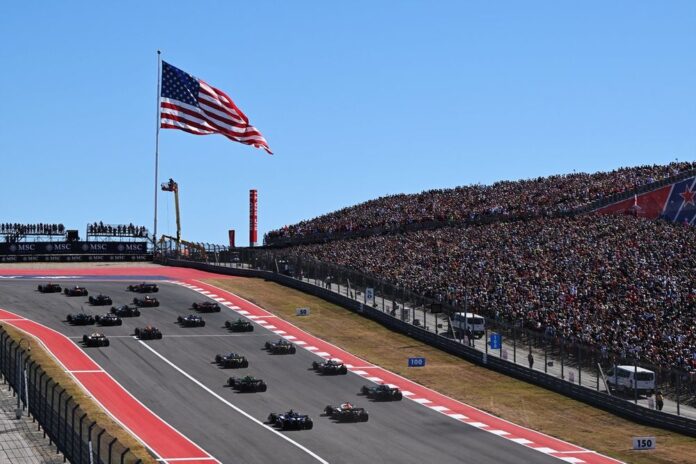After the United States Grand Prix in October, George Russell made a comment about the power of pole position in the 2025 Formula 1 season – or at the very least, the correlation between qualifying and race finishes this season. “Right now in F1, it’s a race to Turn 1,” he noted and, after getting boxed in at the start of the Austin contest, a recovery was scarcely on the cards.
While qualifying should confer some level of reward to drivers who had been able to hook up their laps on a Saturday, it very much feels that it has been of greater importance this season.
Indeed, the numbers support that theory: 14 of the 20 grands prix in 2025 thus far have been won by the polesitter, certainly the highest across the last decade (a 70% conversion rate). Even 2023, a season characterised by single-team and single-driver dominance, did not reach such a rate.
The lowest hit rate in our sample set, 2019 at 38%, showed a clear disparity between Ferrari’s one-lap superiority and its race pace. While Charles Leclerc converted two pole positions, his other four went unrewarded by victory – perhaps symbolic of his surprisingly low conversion rate across his F1 career. If you were feeling uncharitable, you could say Leclerc’s comparative lack of poles this term (his only one emerging in Hungary, which he didn’t win) has helped the hit rate out enormously…
By the same token, Sebastian Vettel converted neither of his pole positions in 2019, Valtteri Bottas converted two of his five poles, and Lewis Hamilton three of his five. Mercedes generally had a car that year which struggled to get heat into its tyres consistently for one lap, but outlasted the Ferraris on degradation through the course of a grand prix. The only non-Mercedes or Ferrari polesitter was Red Bull’s Max Verstappen, who turned one of his two poles into a win.
Across the opening four rounds of 2025, each race (not including sprints) was won by the polesitter. Verstappen’s subsequent two first-place starts for rounds five and six in Jeddah and Miami were won by Oscar Piastri, with the record swapped in Imola when Verstappen pounced on Piastri at Turn 1. Evidently, Russell’s assertion held weight in that particular race.
Of the other three grands prix not won from pole (again, conveniently grouped together), Verstappen didn’t win at Silverstone, Lando Norris lost the lead to Piastri on the first lap in Belgium, and Leclerc’s surprise Hungary pole did not last as Ferrari’s pace receded over long distance. The last six races have all been won by the pole winner.
It has been more difficult to overtake in 2025, and it’s one of the pitfalls of a compact field. If every car is running to a similar level of pace, it makes it very challenging to draw close to the car ahead – let alone make a pass. Even if another driver gets there, the dirty air effect of the current machines has increased versus the original fleet of cars in 2022.
The cars are also at a point where they produce less slipstream in a straight line as they’re so efficient but, equally, the effect of aero development through this current generation means that they tend to produce more dirty air in the corners. Thus, the on-track action very much sits between a rock and a hard place. With smaller rear wings at the faster circuits compared to previous years, it also renders the DRS largely ineffective.
Will qualifying decide the 2025 F1 title?
On its own, no; as Russell opined, it’s still about how a driver contends with the melange of cars around them into the first corner. That said, pole position partly ring-fences a driver away from the majority of that madness, and a good getaway off the line does tend to yield the high ground.
It’s also partly situational. Take a race with low degradation, for instance; the polesitter is more likely to retain it through a race’s milestones, whether it’s Verstappen or one of the two McLarens. In a higher-degradation race (or one with thermal management) with Verstappen starting from the front, McLaren has a bit more of an opportunity to wrest that away.
Take Austin, for example; had Leclerc not produced such a stellar defensive drive versus Norris, Verstappen might have received a greater challenge as the McLaren pace was marginally stronger than that of the Red Bull. It wasn’t a particularly high-deg race, but the loads through the tyres did put them on the edge with problems like overheating.
Max Verstappen, Red Bull Racing
Photo by: Sam Bagnall / Sutton Images via Getty Images
The remaining venues of Brazil, Las Vegas, Qatar, and Abu Dhabi do not unilaterally reward the polesitter, although the finale might be more amenable to a polesitter lights-to-flag affair. Of the others, Sao Paulo could be affected by inclement weather, Las Vegas will be subject to cold graining (which will likely hurt McLaren more than Red Bull), and Qatar will be tough on tyres.
Qualifying will provide an important jumping-off point for the championship, and it’s even more important this year to get that right, but three of the final four races will have additional variables to manage.
Starting on pole will make a driver’s life much easier, but qualifying won’t be the sole arbiter of who wins this year’s championship.
Additional reporting by Ronald Vording
We want your opinion!
What would you like to see on Motorsport.com?
– The Motorsport.com Team
Disclaimer : This story is auto aggregated by a computer programme and has not been created or edited by DOWNTHENEWS. Publisher: motorsport.com






